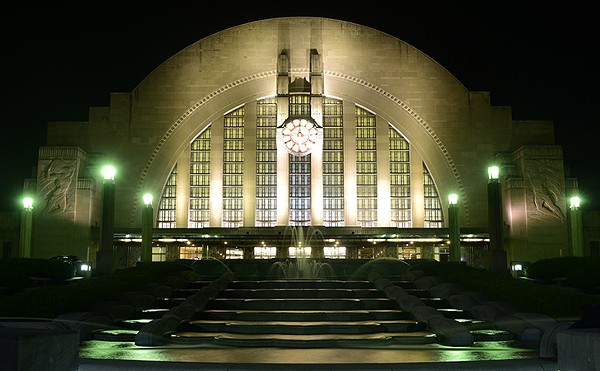Critic's Pick
Three weeks ago I saw the opening of Millennium Approaches, the first part of Know Theatre of Cincinnati’s staging of Tony Kushner’s monumental Angels in America, a work that was first presented early in the 1990s. This week Know added Part II: Perestroika to the repertory performance of this important work, finally receiving its first professional staging in Cincinnati although it’s been an admired work for nearly two decades.
If you don’t read the rest of this review, let me simply say: Miss this show and you’ll kick yourself. It’s a showcase of excellent Cincinnati actors doing one of the most important plays of the past 25 years.
Perestroika has been staged by freelance director Drew Fracher. (Millennium Approaches was directed by Brian Isaac Phillips of Cincinnati Shakespeare, where Fracher is often a guest director.) The narrative from Part I to Part II is continuous, although the shows are better thought of as bookends than original and sequel. Millennium has an air of desperation and foreboding, while Perestroika is blends reconciliation with optimism, joy with pain.
(See my review of Millennium Approaches here.)
Eight actors play the same roles in both parts; all of them also take on a few extra roles necessary to tell the story. The central character is Prior Walter (Rob Jansen), a gay man afflicted with AIDS in the mid-1980s. He's been abandoned by his lover Louis (Joshua Murphy) in his darkest hour. Louis takes up with Joe Pitt (Christopher Guthrie), a young Mormon attorney whose deeply closeted gay feelings have ruined his marriage to Harper (Courtney Brown), an anxious woman who’s become dependent on valium.
Joe’s mother Hannah (Amy Warner) has rushed from Salt Lake City to New York City to aid her son, but he avoids her. Simultaneously the despicable conservative attorney Roy M. Cohn (Michael G. Bath), a powerful man with a secret gay life, is dying of AIDS, attended by male nurse Belize (Darnell Benjamin), a devoted friend of Prior. Prior’s deteriorating health might be causing a repeated hallucination of a descending angel who orders him to become a prophet. Or maybe it’s real.
Part II picks up exactly where Part I ended, with the angel (Liz Vosmeier) crashing into Prior’s life. He is tormented regarding how to respond; he has only Belize to confide in, while Louis and Joe’s relationship is a rollercoaster of passion and angst. The terminally ill Cohn is hospitalized and haunted by the ghost of Ethel Rosenberg (Warner in one of her delicious smaller roles), while Hannah struggles to aid her troubled son Joe and Harper, who has been set adrift mentally and emotionally by Joe’s erratic behavior. Hannah and Prior meet randomly, and the paths of the others intertwine and intersect in ways that are obviously manipulated and yet seemingly natural.
Perestroika is a more rough-and-tumble piece of theater than Millennium, and Fracher’s direction (he is also a fight choreographer) moves his actors through perilous physical moments — fights and flights — that are key to the action and the messages behind the tale. With Fracher’s able guidance, the pieces all come together admirably.
Jansen was moving as the afflicted, anxious Prior in Millennium. In Perestroika he slowly takes on his unwilling role of prophet, trying to deny it — and ultimately assuming it in a way that isn't perhaps what his angelic messenger had in mind but is both necessary and appropriate for him and the time in which he lives. Jansen’s Prior becomes a voice of reason and hope, a singularly memorable performance.
His dark opposite, Bath as the vituperative Cohn, spends most of Perestroika in a hospital bed, spewing his racist bile at anyone within earshot — especially his African-American gay nurse, portrayed by Benjamin with sass, humor and humanity. When Cohn finally dies and Belize drags Louis in to mourn over him by saying the Kaddish, it’s a strangely moving moment.
The death of the power-mongering attorney brings hope and relief for Prior in a most unexpected way, thanks to the quick thinking of Belize, another of Kushner’s plot devices — in a seemingly casual and happenstance manner — that percolates messages just beneath the play’s sometimes humorous and always entertaining surface.
Angel’s scripts are replete with powerful, human moments, none more moving than two in Perestroika: When the anguished Prior is comforted by Hannah, a woman not given to proffering comfort, whose matter-of-fact demeanor is actually a salve to his grief. And again at the work’s final scene, when Prior describes the meaning of the Bethesda Fountain Angel in New York’s Central Park and offers a blessing to his friends and to all of us watching.
Angels in America is some of the best theater offered in Cincinnati this season. The productions’ actors are performing herculean tasks (Millennium and Perestroika are each more than three hours long) with grace, skill, passion and talent. (Several performers were weeping during the curtain call following the opening of Perestroika on April 23.)
Angels in America has been avoided by some theaters unable to envision how to handle a seemingly expansive physical production, but at Know the expansion is your mind and the imagination of those creating this work, especially scenic and lighting designer Andrew Hungerford and directors Phillips and Fracher, who use simple means and devices to stage the story. (The Angel moves about the space in the simplest of ways — borne by two “invisibly” black-clad performers — and you readily accept that she can fly.)
Kushner’s writing was admired and honored in 1993 and 1994 when his plays won Tony Awards and a Pulitzer Prize. Today Angels in America seems remarkably prescient about how the world has evolved in the realm of gay existence and in the way political universes have spun, crashed and risen again.
See these memorable productions and be drawn into the world Prior decides he must remain a part of, urging others to revel in their challenges by seeking “More life!”
ANGELS IN AMERICA, presented by Know Theatre of Cincinnati, is two plays — Part I: Millennium Approaches and Part II: Perestroika — offered in repertory through May 15. Both works are presented in an afternoon/evening configuration on May 1, 8 and 15. Read Rick Pender's review of Part I here.
Buy tickets, check out performance times and get venue details here.






